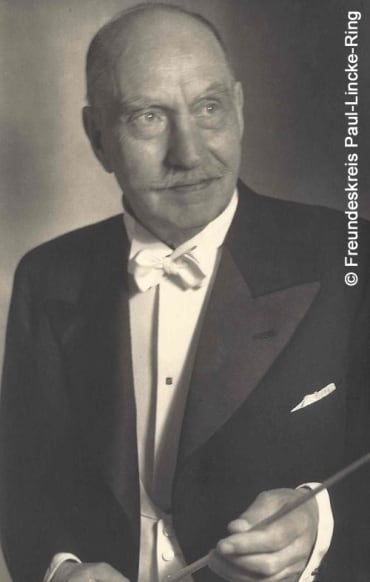Paul Lincke was born in Berlin in 1866. After the untimely death of the father, Emilie Lincke brought up her children all by herself and evidently supported the manifested inclination of Paul towards military music by sending him to Wittenberge in order to be apprenticed by Rudolf Kleinow as he was in charge of the local guild of town musicians. These organizations that dated back to the Middle Ages were appreciated for the known reliable training and at the end of his apprenticeship Lincke mastered the bassoon as well as the barytone, percussion, but also piano and violin. This particular “mix of instruments” corresponded well to the best of German training traditions in this field.
In 1864, however, he had no luck, since he was refused to join Prussian band music service on account of his body measurements. Basically we should be very grateful for this decision as there probably would not have been the successful composer Paul Lincke without this ruling.
The repudiation by he military proved to be only a minor obstacle for his further career, as he soon found interesting engagements with the Apollo Theater, the Königsstädtisches Theater and Belle Alliance where he was able to gain valuable experience in the realm of light and dance music. For such occasions, he also used several works of his own. This development reached a first apogee with the one- act vaudeville play “Venus auf Erden” (“Venus on Earth”) in 1897. During that period, Lincke was successfully active at the world-famous Folies Bergère Theater in Paris, which undoubtedly was not derogatory at all for his international reputation. At latest from 1908 on, he had achieved a major breakthrough when he was appointed musical director and composer of the Metropol Theater. At that time its extravagant and grandiose chorus lines were regarded the climax of light entertainment in Berlin.
Throughout his life, Paul Lincke was a respected and highly esteemed musician a composer of at least European fame and a highly elegant conductor. His especial merit, however, were his activities for the operetta in Berlin. Consequently, he is rightly addressed, accepted and honored as “father of the Berlin operetta”, and he therefore holds the same position in this field as Johann Strauss II and Jacques Offenbach who, in the same way, achieved extraordinary success for the sake of the operetta in Vienna and Paris.
Paul Linke who was bestowed upon the honorary citizenship of Berlin in November 1941 died shortly after completing his 80th year in Hahnenklee in the Upper Harz Mountains.
